News
Fall 2012
Launched the North Campus Biomedical Blog for updated news and events.
Launched the PodCast Portal so students can get their lectures anytime, anywhere, in pure HTML5.
Spring 2012
Biomedical Sciences has come to North Campus.
North Campus spends $400,000 on Biomedical Sciences initiatives.
North Campus hires five new natural science doctorates.
New WebSite for North Biomedical Sciences.
B.S. Biomedical Sciences
The B.S. degree in Biomedical Sciences (B.S.) has come to North Campus at Florida State College at Jacksonville. A biomedical degree can propel you into the career of your dreams. Whether you chose medical school, physician's assistant, graduate school in the natural sciences, or as a laboratory or research assistant or technician, the biomedical program at North Campus can fulfill your dreams and career goals.
We have the most qualified and experienced professors with the most up-to-date state-of-the-art teaching laboratories and equipment designed to teach you everything you need to know for a successful career in biomedical sciences. Whichever focus you chose, whether a biological or a biochemical concentration, North Campus has designed upper level biomedical courses to suit your educational needs.
All Biomedical Course Descriptions
Stephen Lukacs, Ph.D. Biophysical Chemistry
Dr. Lukacs (lucas) specializes in computer programming, chemical instrumentation, and biophysical chemistry. He is dedicated to merging biochemical concept with hands-on instrumentation. He has developed the course descriptions and outlines for Chemistry Instrumentation (CHM 3130C), and Physical Chemistries I and II (CHM 4410 and 4411) for the B.S. in Biomedical Sciences Program. Along with the other biomedical courses, all three courses were accepted by the State of Florida and accredited by SACS. He has developed the courses and the laboratories at North Campus to suit your needs as a student entering the biomedical workforce, medical, or graduate school.
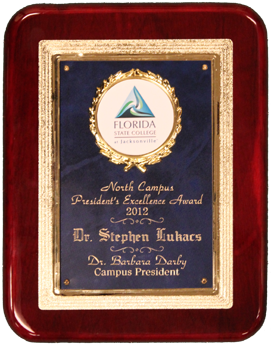 | 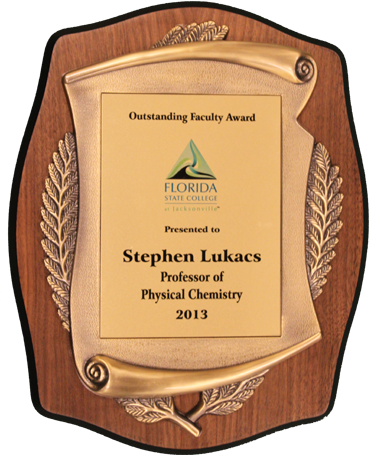 | 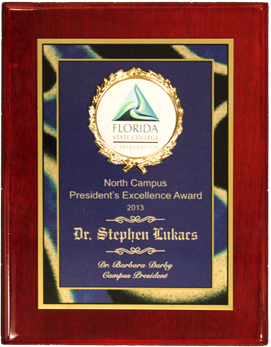 |
Excerpt from FSCJ Convocation 2013 - "A graduate of four B.S. degrees in the natural sciences from UCF and a Ph.D. in biophysical chemistry from Rutgers, Dr. Lukacs brings the breadth and depth of his knowledge and learning experience to his students in lower-level chemistry and upper-level biomedical sciences at North Campus. While spearheading the biomedical program at North Campus, Dr. Lukacs expands his students’ minds with a multi-leveled multi-faceted approach of traditional lecturing, hands-on laboratory and data analysis, and advanced podcasting to increase the exposure of real-life scenarios to his aspiring nursing, graduate, medical, and pharmacy students."
Innovative Faculty Award 2014-2015
My Portofolio in Acrobat PDF format
Click here to view my Innovative Faculty Award Video for the academic year of 2014 - 2015.
Personally, my philosophy centers on two complimentary aspects. Have dreams, have goals and objectives, accomplish them, achieve them, focus on them, and feel good about your successes. Success is NOT a zero sum game. We can discuss that at another time but I digress for the moment.
The first aspect to achieving your dreams is be intelligent, use your mind, learn to think, honestly, directly, analyze, and confirm the accuracy of your thoughts through hard undeniable undebatable reality. Intelligence, both mental and heart, is the necessary ingredient to strategize to formulate the potential shortest path to achieve the goal. The second aspect to exercising your intelligence, is a solid, honest, and persistent work ethic. Even geniuses have to work to achieve. A work ethic is the necessary ingredient to implement and bring forth your strategy into the real world, through your hands and complimenting relationships. Just as work is force through a distance, aka, physics 101, so is accomplishment. Accomplishment is success. And, success is intelligence through work. Dr. Lukacs...
Upper Level Courses
Chemistry Instrumentation (CHM 3130C)
Chemistry Instrumentation (simply Instrumental) is the coolest core-class required for all students in the Biomedical Sciences program at FSCJ. It combines chemistry with CSI-type instrumentation to characterize chemical substances or select specific substances from mixtures. You're going to have a lot of fun in this course.
Chemistry Instrumentation (CHM 3130C)
The textbook requirements for instrumental are Brookes Cole's Principles of Instrumental Analysis by Skoog and Wiley's Chemistry Experiments for Instrumental Methods by Sawyer.
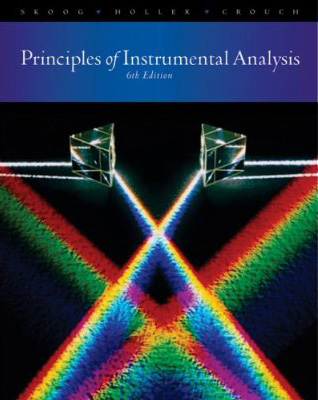 |
Principles of Instrumental Analysis, 6E Douglas A. Skoog, F. James Holler, Stanley R. Crouch ISBN-10: 0495012017 ISBN-13: 9780495012016 |
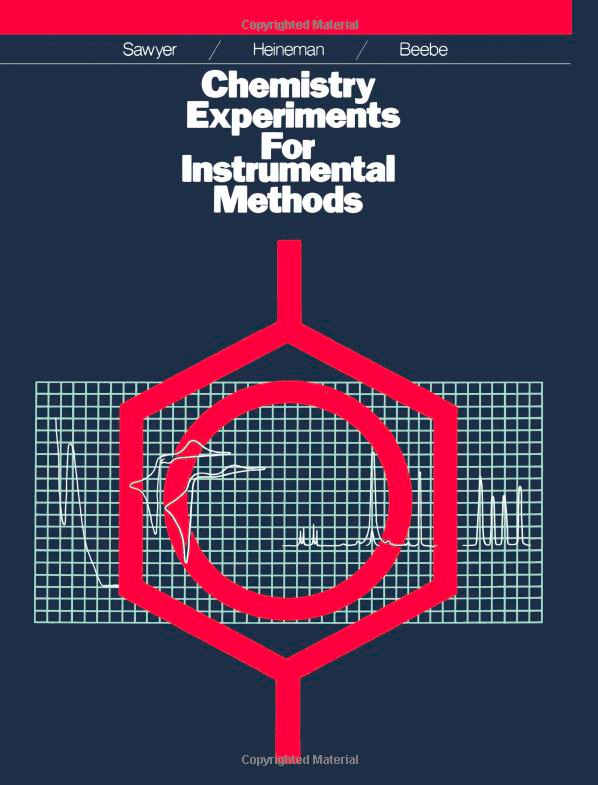 | Chemistry Experiments for Instrumental Methods, 1/E Donald T. Sawyer, William R. Heineman, Janice M. Beebe ISBN-10: 047189303X ISBN-13: 9780471893035 |
Skoog and Sawyer have been the de facto standard textbooks for Instrumental for the last 30 to 40 years. Although they require focused and rereading by the student because of the their concentrated material and depth of understanding, these texts present every pertinent aspect of all modern instruments used in the laboratory today. I used Skoog as an undergraduate student at UCF, then I used it when I taught Instrumental at Rutgers, and I use it now at FSCJ. Why? Because it is the most comprehensive. For instance, it contains four chapters on basic circuits, electronics, and computer acquisition of electronic signals from samples and computer processing. It also has an extensive appendix on the processing and handling of data that is gathered by these instruments. Such data processing includes an understanding of systematic versus random error, mean and standard deviation, confidence intervals leading up to hypothesis testing, error and tolerance propogation, line and expression fitting of standards via least squares regression, and interpolation versus extrapolation. My lectures augment all of these necessary and vital components of modern laboratory work using commonly available software such as Microsoft Excel. My lectures are a combination of written and PodCasted media to allow you, the student, to watch and rewatch the content throughout the semester.
I have designed this class to include the nut-and-bolts of what is inside the black boxes. This way you will understand the nature and essence of the instruments you will be using in your future career. You will learn the basics of circuits and signal amplification, acquisition, and processing, computer programming, and how the data ties back to the chemical substances.
Think of your courses throughout your college career. Haven't you spent most of your time sitting in a seat and listening to lectures? Sure you learned a lot, but wouldn't you want to spend some time in a real active functional laboratory, doing actual hands-on real science, for just one of your college courses? I have designed Instrumental for the students to meet that need. To fill the needs of hands-on, fully curious, intellectual students wanting to be ready for their biomedical, science, or medical careers.
My Instrumental class is designed to go way beyond simple demonstrations or recipe quick-and-dirty labs. Every student works in groups of no more than two students per group and every student has full access and availability to perform every aspect of the laboratory and touch-and-feel the working living instrument. Every aspect means that the students prepare the stock and standard solutions, prepare the raw samples, run the solutions and samples through the instrument, use the software to control the instrument and collect the data, and then process that data and report it in your formal report. Such exposure and hands-on access is invaluable to understanding the sensititivity, quirks, noises, and nature of the instrument. You just can't get that kind of experience from a lecture or demonstration.
Here are the labs and instruments that you will be exposed to in my Instrumental course:
Lab |
Description |
1 |
Test and Measurement Instrumentation and Amplifying Circuits for Sample-to-Signal Amplification. |
2 |
Signal Processing, Analog-to-Digital Conversion (ADC), and Computer Programming through National Instruments LabView. |
3 |
Conductivity and Total Salt Determination of Pure, Drinking, and Sea Water. |
4 |
Ion-Selective (ISE) Potentiometry and Sodium Ion Determination of Pure, Drinking, and Sea Water. |
5 |
Conductiometric Standardization of NaOH with pH and Potentiometric Titrations of Phosphoric Acid. |
6 |
Fourier-Transform Infrared (FTIR) Spectroscopy of Organics, Amino Acids, and Proteins |
7 |
Ultraviolet-Visible (UV-Vis) Spectroscopic Determination of Caffeine, Aspirin, Tylenol in Pharmaceuticals. |
8 |
Fluorescence of Pharmaceuticals and Green Fluorescent Protein (GFP). |
9 |
Atomic Emission and Absorption (Flame AA) Spectroscopies for the Determination of Sodium and Mercury Ions in Drinking Water and Food, i.e., Tuna Fish. |
10 |
Impedance and Dielectric Spectroscopy for the Determination of Dipole Moments in Organics and Amino Acids. |
11 |
Proton Nuclear Magnetic Resonance (H-NMR) of Organics, APC Tablets, and Excedrin. |
12 |
Proton Nuclear Magnetic Resonance (H-NMR) of Amino Acids & Dipeptide Sequencing. |
13 |
Garage Gas Chromatography (GC) and Commercial GC/Mass Spectroscopy (GC/MS) of Organics. |
14 |
Determination of Hemoglobin's Molar Mass via Size-Exclusion Column Chromatography. |
15 |
Separation of Cellular Metabolites from Gross Recombinant GFP E. Coli to Extract GFP using Ion-Exchange Chromatography. |
16 |
Isoelectric Focusing (IEF) Electrophoresis of Proteins. |
As the student in this class, in addition to learning the nut-and-bolts of the above instruments and their respective technologies, you will also learn how to properly make analytical solutions using volumetric glassware to make standards and calibrate the instruments, how to process the data collected your experiments, and practicality for such tests, its biomedical applications, and if the experiment produced the proper results through hypothesis testing.
Simply put, all of my successful students realize the value of learning this material, realize that science, in their words, is "hard work" but "gratifying", "honorable", "awesome", and "rewarding". My students are extremely proud of their accomplishments in the class. And I am very pleased with their pride and hard earned self confidence.
Physical Chemistry I and II (CHM 4410 and 4411)
Physical Chemistry (simply pchm) is a biochemistry concentration course for those students in the Biomedical Sciences program at FSCJ. It is the most basic chemistry; comprising the nature of the atom, heat, and kinetics making up the most fundamental understanding of our entire universe. The challenges of learning pchm is the coupling of mathematics with physical observation; leading to the structure of the atom, the covalent bond of the molecule, the flow of light and heat energy to and from a collection of atoms or molecules, and ultimately how molecules react with each other.
Physical Chemistry I (CHM 4410)
Physical Chemistry II (CHM 4411)
The textbook requirements for pchm are Wiley's Principles of Physical Chemistry and Wolfram's Mathematica
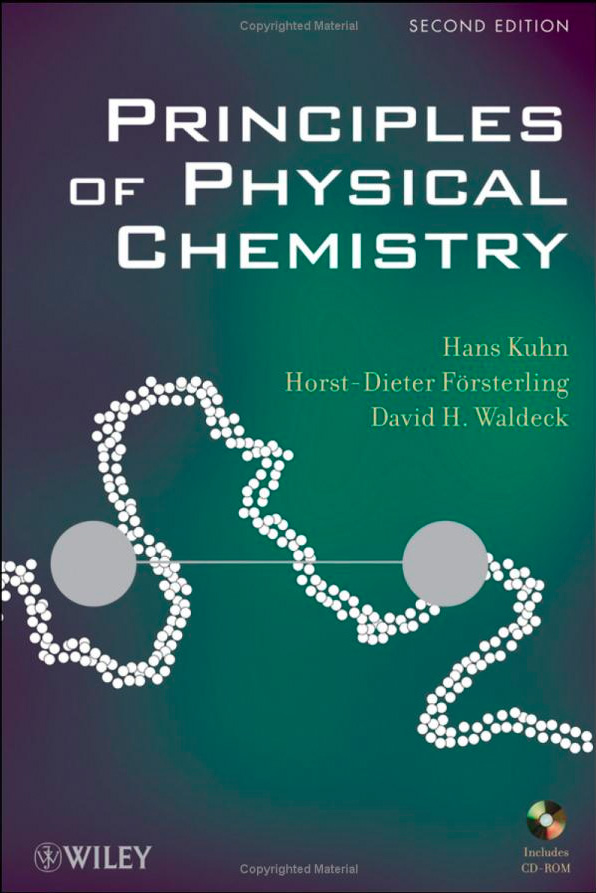 | Principles of Physical Chemistry, 2/E Hans Kuhn, Horst-Dieter Forsterling, David H. Waldeck ISBN-10: 0470089644 ISBN-13: 9780470089644 |
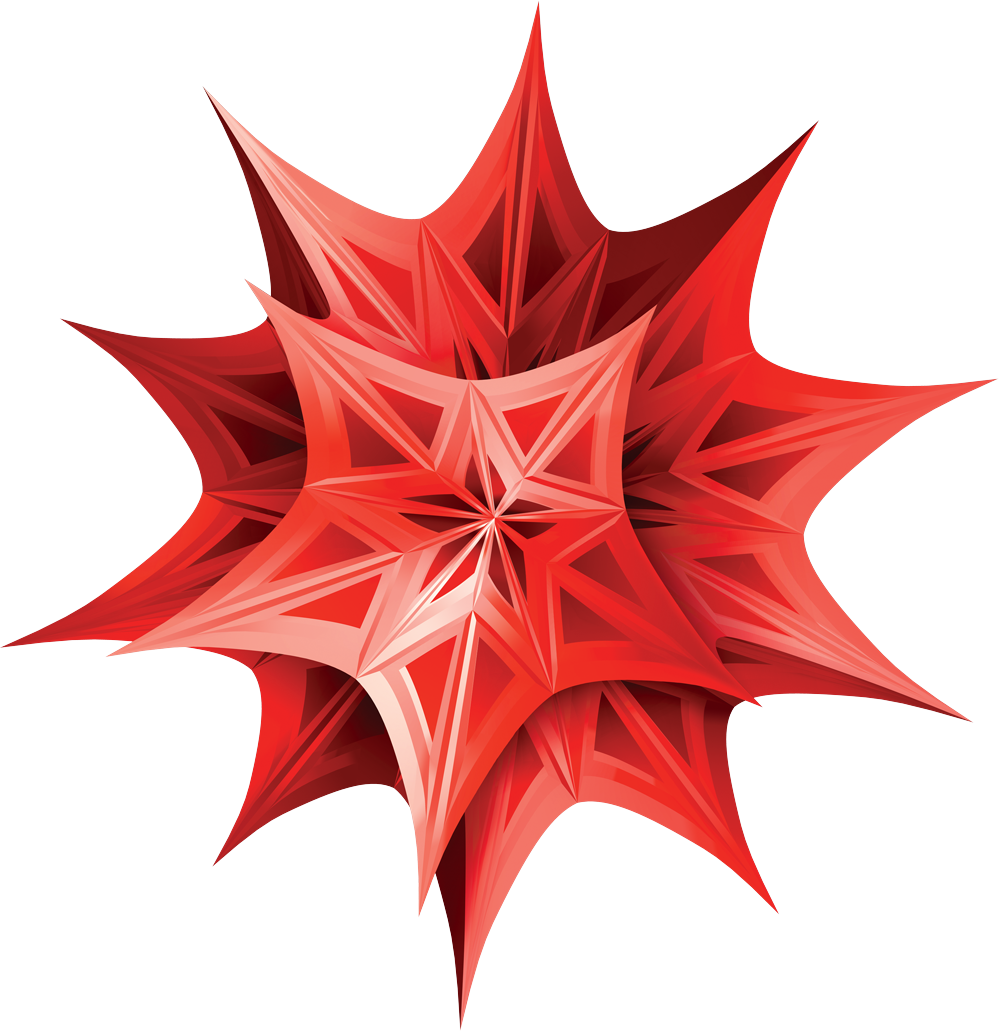 |
Mathematica, 9/E Stephen Wolfram Mathematica for Students, Annual Edition |
Lower Level Courses
Introduction to General Chemistry (CHM 1025C)
The textbook requirements are McGraw-Hill's Introduction to Chemistry by Bauer. The latest edition is the third (3rd) edition, however, if you can get an earlier edition cheaper, then you are welcome to save the money. My only requirement is that you have your textbook in hand when the class starts. If you order your text online, even on Amazon, you should order it at least a couple of weeks before the semester starts. Here are the cover arts and ISBNs for the previous two editions:
 | Introduction to Chemistry, 3/E Rich Bauer, James Birk, and Pamela Marks ISBN-10: 0073402672 ISBN-13: 978-0073402673 |
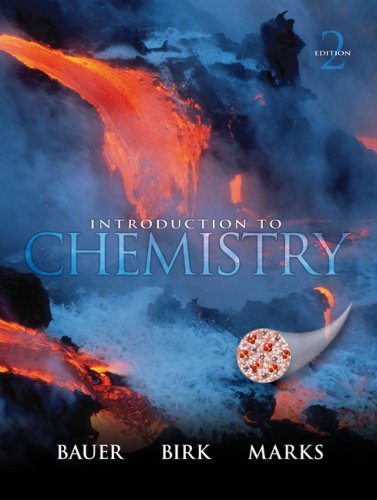 | Introduction to Chemistry, 2/E Rich Bauer, James Birk, and Pamela Marks ISBN-10: 007727430X ISBN-13: 978-0077274306 |
I also require you to have online access to McGraw-Hill's Connect/LearnSmart system. The chapter quizzes will be under Connect and LearnSmart can act as an optional online tutor to help you, the student, identify your strengths and weaknesses in each chapter to help you prepare for the assessments.
I also offer an extensive series of PodCasts for Introduction to and Principles of General Chemistry. The PodCasts are located at http://weinstruct.org/weinstruct/main/course/1. Access is free to anyone, you just need to Register to view the PodCasts.
Principles of General Chemistry (CHM 1032C)
The textbook requirements are Pearson's Fundamentals of General, Organic, and Biological Chemistry by McMurry. The latest edition is the seventh (7th) edition, however, if you can get an earlier edition cheaper, then you are welcome to save the money. My only requirement is that you have your textbook in hand when the class starts. If you order your text online, even on Amazon, you should order it at least a couple of weeks before the semester starts. Here are the cover arts and ISBNs for the previous two editions:
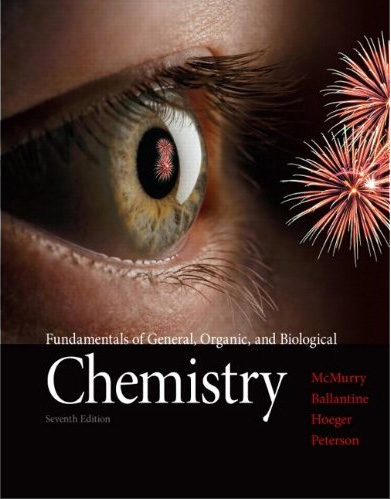 | Fundamentals of General, Organic, and Biological Chemistry, 7/E John McMurry, Carl A. Hoeger, Virginia E. Peterson, David S. Ballantine ISBN-10: 0321750837 ISBN-13: 9780321750839 |
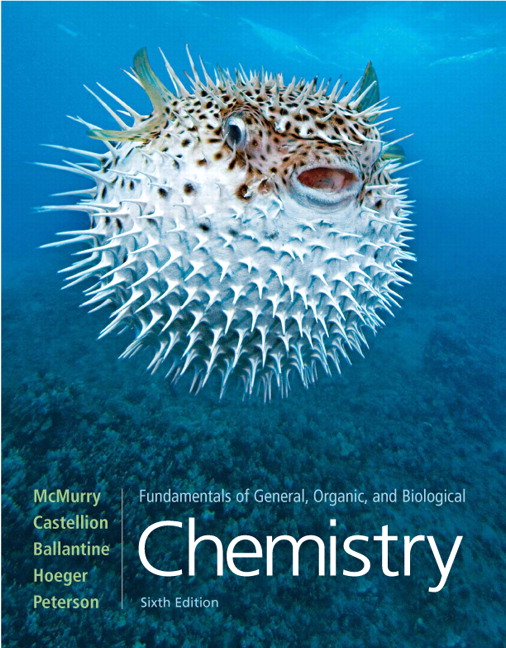 | Fundamentals of General, Organic, and Biological Chemistry, 6/E John McMurry, David S. Ballantine, Carl A. Hoeger, Virginia E. Peterson ISBN-10: 0136054501 ISBN-13: 9780136054504 |
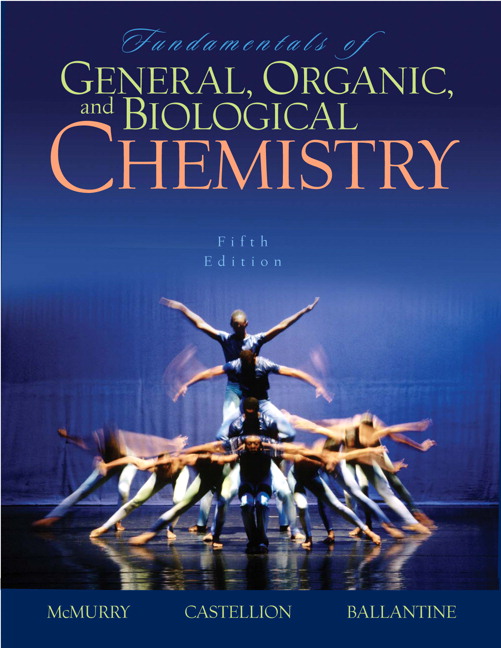 | Fundamentals of General, Organic, and Biological Chemistry, 5/E John McMurry, Mary E. Castellion, David S. Ballantine ISBN-10: 0131877488 ISBN-13: 9780131877481 |
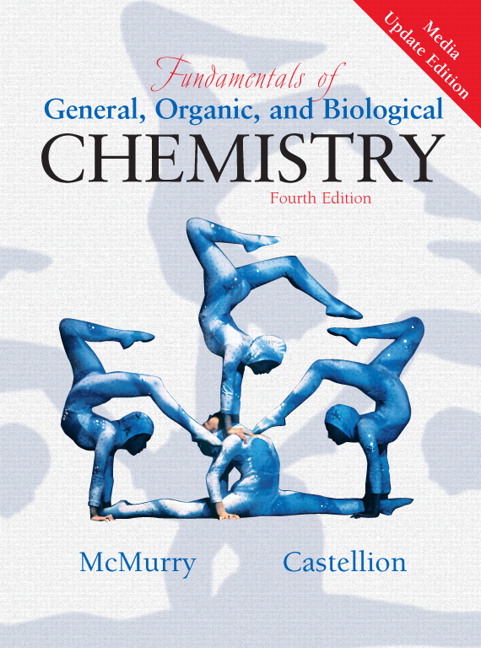 | Fundamentals of General, Organic, and Biological Chemistry, 4/E John McMurry, Mary E Castellion ISBN-10: 0131486845 ISBN-13: 9780131486843 |
I also offer an extensive series of PodCasts for Introduction to and Principles of General Chemistry. The PodCasts are located at http://weinstruct.org/weinstruct/main/course/1. Access is free to anyone, you just need to Register to view the PodCasts.
See you when the semester starts...
